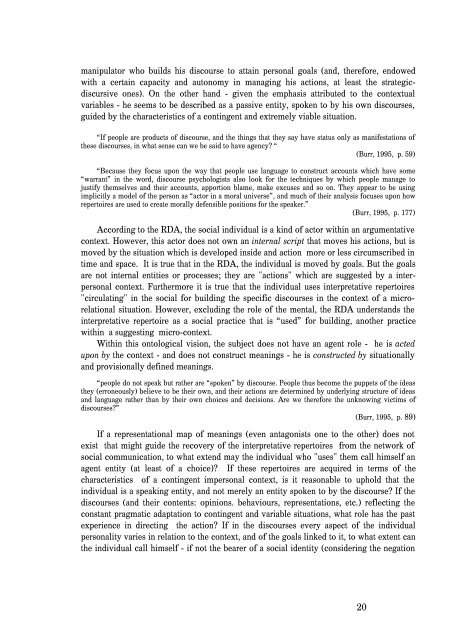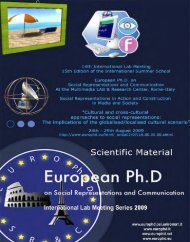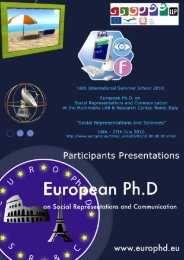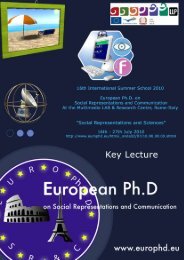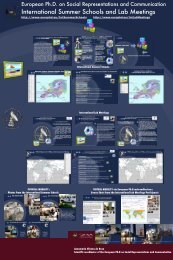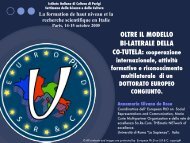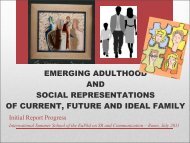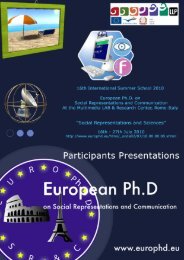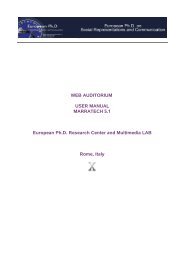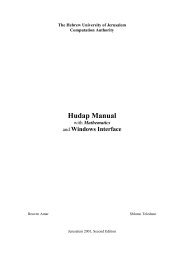The "boomerang" effect of the radicalism in discourse analysis
The "boomerang" effect of the radicalism in discourse analysis
The "boomerang" effect of the radicalism in discourse analysis
You also want an ePaper? Increase the reach of your titles
YUMPU automatically turns print PDFs into web optimized ePapers that Google loves.
manipulator who builds his <strong>discourse</strong> to atta<strong>in</strong> personal goals (and, <strong>the</strong>refore, endowed<br />
with a certa<strong>in</strong> capacity and autonomy <strong>in</strong> manag<strong>in</strong>g his actions, at least <strong>the</strong> strategicdiscursive<br />
ones). On <strong>the</strong> o<strong>the</strong>r hand - given <strong>the</strong> emphasis attributed to <strong>the</strong> contextual<br />
variables - he seems to be described as a passive entity, spoken to by his own <strong>discourse</strong>s,<br />
guided by <strong>the</strong> characteristics <strong>of</strong> a cont<strong>in</strong>gent and extremely viable situation.<br />
“If people are products <strong>of</strong> <strong>discourse</strong>, and <strong>the</strong> th<strong>in</strong>gs that <strong>the</strong>y say have status only as manifestations <strong>of</strong><br />
<strong>the</strong>se <strong>discourse</strong>s, <strong>in</strong> what sense can we be said to have agency? “<br />
(Burr, 1995, p. 59)<br />
“Because <strong>the</strong>y focus upon <strong>the</strong> way that people use language to construct accounts which have some<br />
“warrant” <strong>in</strong> <strong>the</strong> word, <strong>discourse</strong> psychologists also look for <strong>the</strong> techniques by which people manage to<br />
justify <strong>the</strong>mselves and <strong>the</strong>ir accounts, apportion blame, make excuses and so on. <strong>The</strong>y appear to be us<strong>in</strong>g<br />
implicitly a model <strong>of</strong> <strong>the</strong> person as “actor <strong>in</strong> a moral universe”, and much <strong>of</strong> <strong>the</strong>ir <strong>analysis</strong> focuses upon how<br />
repertoires are used to create morally defensible positions for <strong>the</strong> speaker.”<br />
(Burr, 1995, p. 177)<br />
Accord<strong>in</strong>g to <strong>the</strong> RDA, <strong>the</strong> social <strong>in</strong>dividual is a k<strong>in</strong>d <strong>of</strong> actor with<strong>in</strong> an argumentative<br />
context. However, this actor does not own an <strong>in</strong>ternal script that moves his actions, but is<br />
moved by <strong>the</strong> situation which is developed <strong>in</strong>side and action more or less circumscribed <strong>in</strong><br />
time and space. It is true that <strong>in</strong> <strong>the</strong> RDA, <strong>the</strong> <strong>in</strong>dividual is moved by goals. But <strong>the</strong> goals<br />
are not <strong>in</strong>ternal entities or processes; <strong>the</strong>y are "actions" which are suggested by a <strong>in</strong>terpersonal<br />
context. Fur<strong>the</strong>rmore it is true that <strong>the</strong> <strong>in</strong>dividual uses <strong>in</strong>terpretative repertoires<br />
"circulat<strong>in</strong>g" <strong>in</strong> <strong>the</strong> social for build<strong>in</strong>g <strong>the</strong> specific <strong>discourse</strong>s <strong>in</strong> <strong>the</strong> context <strong>of</strong> a microrelational<br />
situation. However, exclud<strong>in</strong>g <strong>the</strong> role <strong>of</strong> <strong>the</strong> mental, <strong>the</strong> RDA understands <strong>the</strong><br />
<strong>in</strong>terpretative repertoire as a social practice that is “used” for build<strong>in</strong>g, ano<strong>the</strong>r practice<br />
with<strong>in</strong> a suggest<strong>in</strong>g micro-context.<br />
With<strong>in</strong> this ontological vision, <strong>the</strong> subject does not have an agent role - he is acted<br />
upon by <strong>the</strong> context - and does not construct mean<strong>in</strong>gs - he is constructed by situationally<br />
and provisionally def<strong>in</strong>ed mean<strong>in</strong>gs.<br />
“people do not speak but ra<strong>the</strong>r are “spoken” by <strong>discourse</strong>. People thus become <strong>the</strong> puppets <strong>of</strong> <strong>the</strong> ideas<br />
<strong>the</strong>y (erroneously) believe to be <strong>the</strong>ir own, and <strong>the</strong>ir actions are determ<strong>in</strong>ed by underly<strong>in</strong>g structure <strong>of</strong> ideas<br />
and language ra<strong>the</strong>r than by <strong>the</strong>ir own choices and decisions. Are we <strong>the</strong>refore <strong>the</strong> unknow<strong>in</strong>g victims <strong>of</strong><br />
<strong>discourse</strong>s?”<br />
(Burr, 1995, p. 89)<br />
If a representational map <strong>of</strong> mean<strong>in</strong>gs (even antagonists one to <strong>the</strong> o<strong>the</strong>r) does not<br />
exist that might guide <strong>the</strong> recovery <strong>of</strong> <strong>the</strong> <strong>in</strong>terpretative repertoires from <strong>the</strong> network <strong>of</strong><br />
social communication, to what extend may <strong>the</strong> <strong>in</strong>dividual who "uses" <strong>the</strong>m call himself an<br />
agent entity (at least <strong>of</strong> a choice)? If <strong>the</strong>se repertoires are acquired <strong>in</strong> terms <strong>of</strong> <strong>the</strong><br />
characteristics <strong>of</strong> a cont<strong>in</strong>gent impersonal context, is it reasonable to uphold that <strong>the</strong><br />
<strong>in</strong>dividual is a speak<strong>in</strong>g entity, and not merely an entity spoken to by <strong>the</strong> <strong>discourse</strong>? If <strong>the</strong><br />
<strong>discourse</strong>s (and <strong>the</strong>ir contents: op<strong>in</strong>ions. behaviours, representations, etc.) reflect<strong>in</strong>g <strong>the</strong><br />
constant pragmatic adaptation to cont<strong>in</strong>gent and variable situations, what role has <strong>the</strong> past<br />
experience <strong>in</strong> direct<strong>in</strong>g <strong>the</strong> action? If <strong>in</strong> <strong>the</strong> <strong>discourse</strong>s every aspect <strong>of</strong> <strong>the</strong> <strong>in</strong>dividual<br />
personality varies <strong>in</strong> relation to <strong>the</strong> context, and <strong>of</strong> <strong>the</strong> goals l<strong>in</strong>ked to it, to what extent can<br />
<strong>the</strong> <strong>in</strong>dividual call himself - if not <strong>the</strong> bearer <strong>of</strong> a social identity (consider<strong>in</strong>g <strong>the</strong> negation<br />
20


